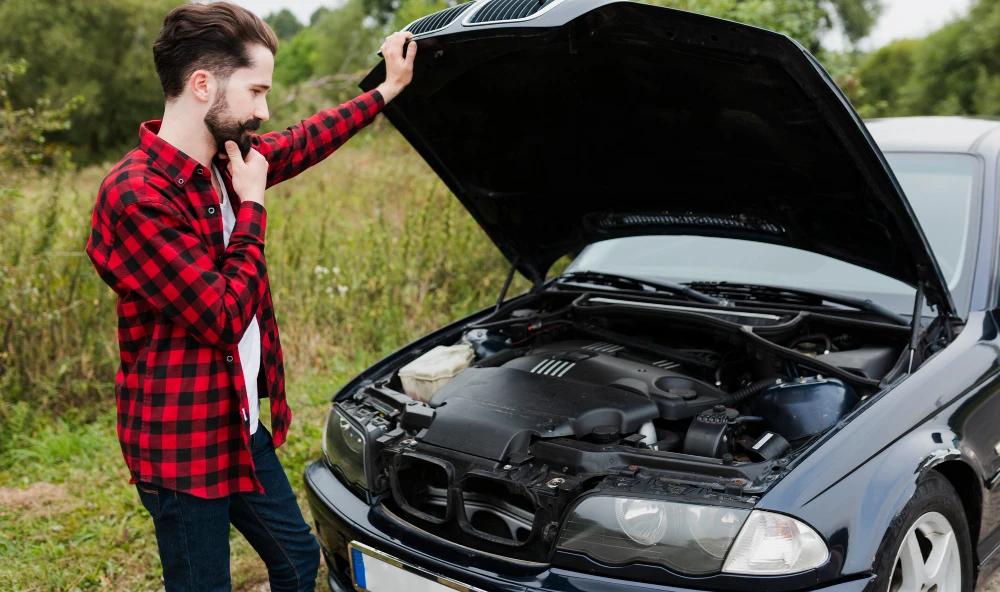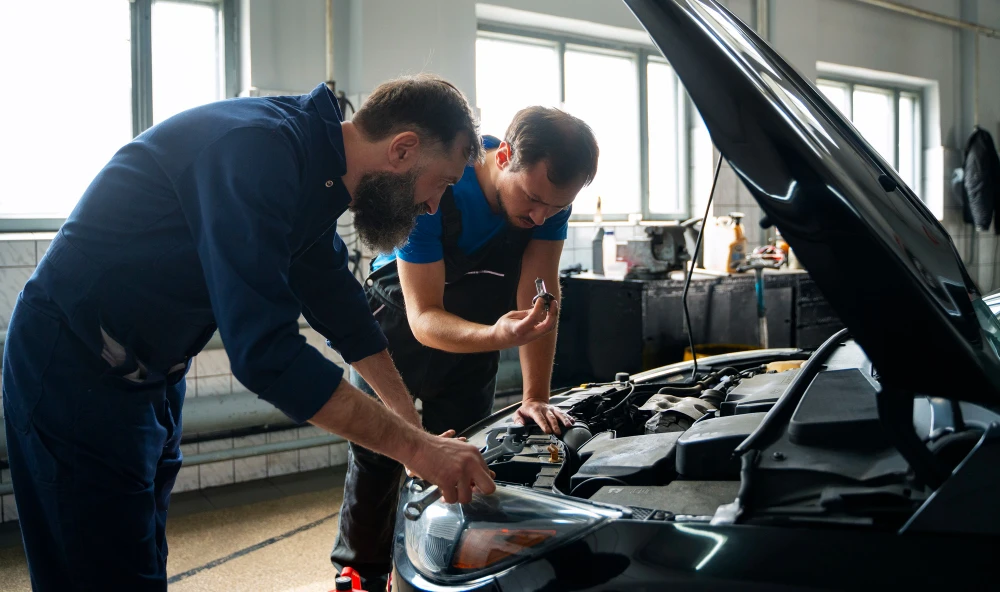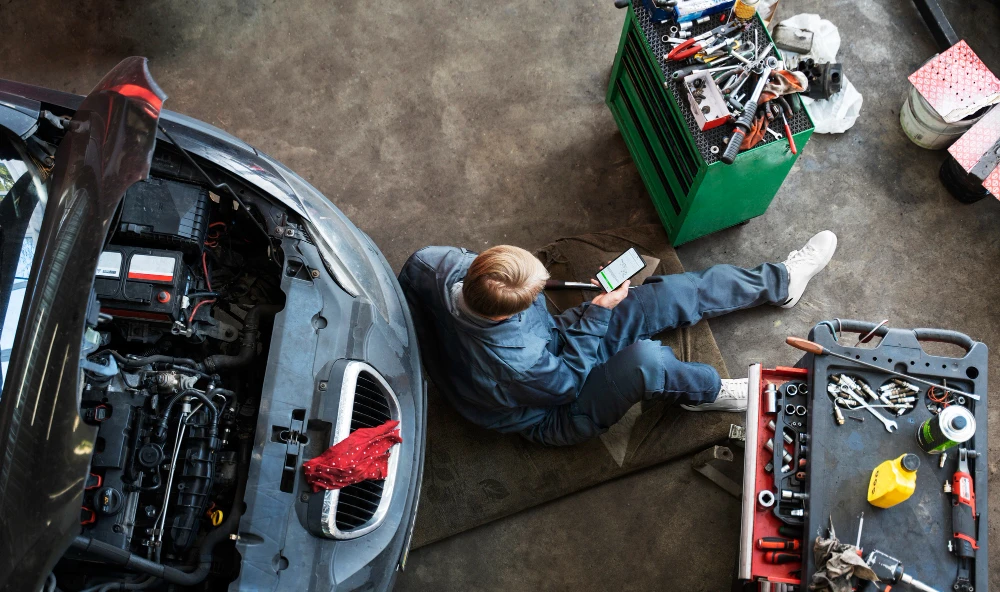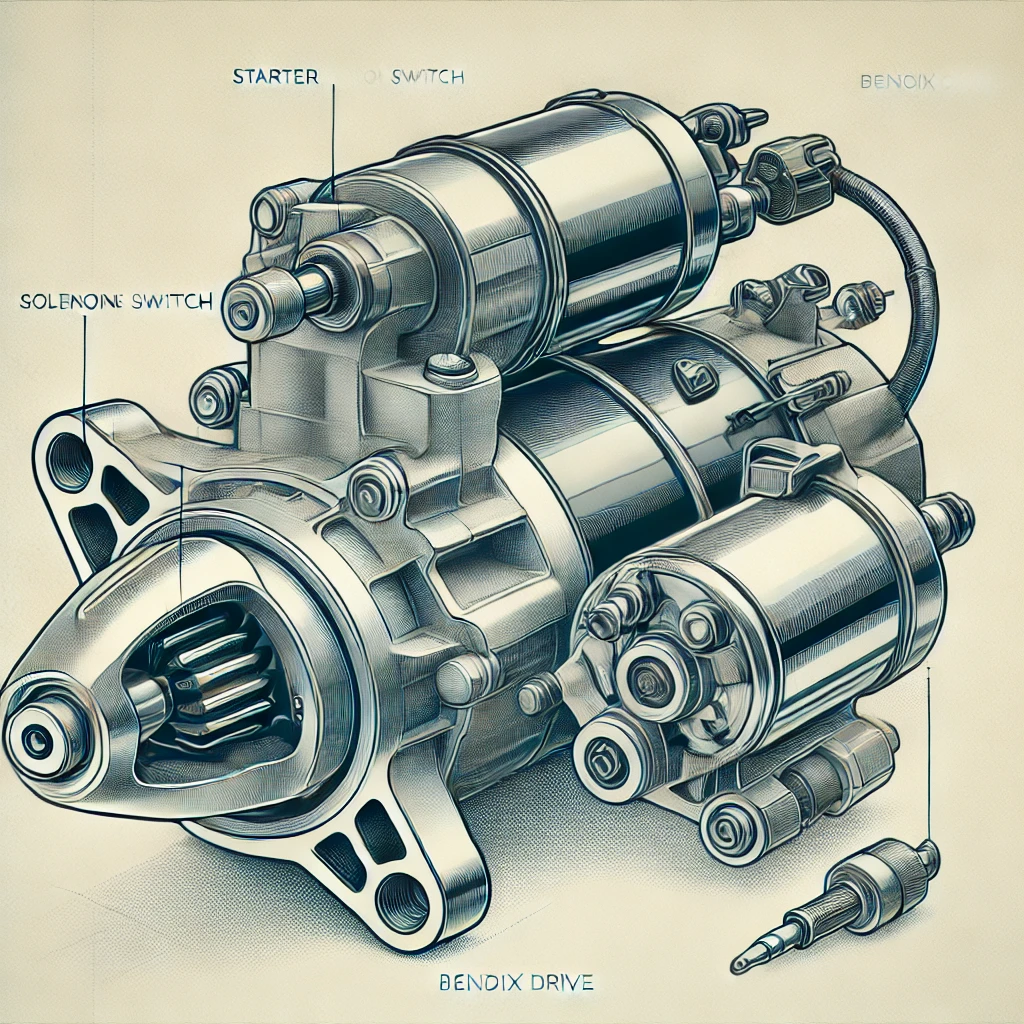A dependable car is a blessing, but nothing is as disheartening as having a car that will not start. A faulty starter solenoid is one cause of such a frustrating situation.
By knowing the role of a starter solenoid, the possible causes of failures, and how to avoid them, you can be prepared for any breakdowns and avoid expensive repairs. Many auto repair Houston are experienced in diagnosing starter solenoid issues quickly and efficiently.
The starter solenoid is necessary because it deals with the heavy current necessary to turn the engine over while sparing the rest of the ignition switch, which can be rather delicate and easily burned out.
If the starter solenoid is not working properly, your car will not start, leaving you stranded. Knowing its function makes it easier to appreciate the value of maintaining it in proper working condition for efficient vehicle performance.
In this blog post, we will be looking at some of the things that you should do to ensure that the starter solenoid is well maintained. We will also mention the signs of a faulty starter solenoid and what to do in the event that it fails.
If you’re searching for ‘auto repair near me,’ we’re here to help — book your service today.
Why Preventative Maintenance is Essential

Starter solenoid requires equal care since it is an important component that can fail at any time without prior warning hence costly to repair. If you keep up with routine car electrical system maintenance, then everything will run perfectly fine.
The performance of a checkup means that the solenoid and other related parts are in good working condition and, therefore, minimize the chances of experiencing starting problems.
At the same time, the electrical system of the car will also experience a longer lifespan.
The first advantage of preventative maintenance is that it offers a chance to identify any issues before they become serious.
This means that by performing scheduled checks and a starter solenoid inspection, one can easily detect various problems, such as corroded connections, worn-out components, or even frayed wires before they worsen.

Maintenance also helps to increase the efficiency of your car and this is why it is referred to as preventative maintenance.
A good and healthy starter solenoid means that the vehicle starts without a hitch each time you turn the ignition, and this gives a lot of comfort, knowing that your car will always start as it should.
| Read More: The Importance Of Routine Car Tune-Ups |
Understanding the Starter Solenoid
Before diving into the preventative measures, it’s essential to understand what the starter solenoid is and how it functions.
The starter solenoid is a small but vital component of your car’s starting system.
When you turn the ignition key, the solenoid receives a small electrical charge from the battery, which it then uses to close a circuit, sending a larger electrical current to the starter motor. This current engages the motor, which in turn starts your engine.
How Do I Know If My Starter Solenoid Is About to Fail?
1. Clicking Sound When Turning the Key
One of the most common symptoms of a failing starter solenoid is a clicking sound when you turn the ignition key.
This clicking noise indicates that the solenoid is trying to engage the starter motor but is not able to make a solid electrical connection.
If you hear a single click or a series of rapid clicks, it’s likely that the solenoid is not functioning correctly.
2. No Response When Turning the Key
If you turn the ignition key and there is no response, that means no clicks and no engine turnover.
Then, this could be a sign that the starter solenoid has completely failed. In this case, the solenoid is not transmitting any electrical current to the starter motor, leaving the engine unable to start.
3. Intermittent Starting Problems
Intermittent starting problems can also indicate a failing starter solenoid. If your vehicle sometimes starts without any issues and other times does not respond at all, it may be due to inconsistent solenoid performance. This erratic behavior suggests that the solenoid is on the verge of failure.
4. The Starter Motor Runs Without Engaging the Engine
If you hear the starter motor running but the engine does not crank, this could indicate that the solenoid is failing to engage the starter drive with the engine flywheel. This means the solenoid is not moving the pinion gear into position to turn the engine over.
5. Engine Cranks Slowly
A failing solenoid can result in a weak or insufficient electrical current reaching the starter motor.
This can cause the engine to crank slowly, even if the battery is fully charged. Slow cranking can also be a sign of other issues, so it’s essential to have the solenoid checked if this symptom occurs.
Common Causes of Starter Solenoid Problems
1. Corrosion and Dirt Build-Up
Sulphation and oxidation are likely to occur on the solenoid electrical contacts in addition to the build-up of dirt on the solenoid.
This build-up can act as an insulator that slows down the flow of electricity and therefore leads to poor performance or total failure of the solenoid.
This problem can be avoided by properly cleaning and maintaining such connections.
2. Worn-Out Contacts
The solenoid in the car has internal contacts that carry electrical current to the starter motor. These contacts can become worn over time, and this is especially due to the usage of the device; it may lead to a weak or intermittent connection. This wear can cause starting problems and may require the replacement of the solenoid, but they are usually not very expensive.
3. Faulty Wiring
Depending on the wiring connected to the starter solenoid, the wiring can get damaged because of heat, vibrations, and normal wear of the wires.
This may result from frayed wires, and since electrical connection is important for the proper functioning of the solenoid, poor connectivity may lead to a faulty solenoid.
Faulty wires are known to cause such problems, and the solution to the problem will involve inspecting and replacing the wires as necessary.
4. Mechanical Failure
The starter solenoid has several parts, which include the plunger and the spring of the solenoid.
These components can become worn out or jammed due to regular use, accumulation of dirt and grime or even due to lack of lubrication.
It is also true that mechanical failure can occur in the solenoid which can cause it to stay stuck in one position and it may need to be cleaned or lubricated or even have the faulty parts replaced.
Preventative Maintenance Tips
To ensure that you do not struggle with a car that fails to start, here are some preventive maintenance tips that will help in checking the health of the starter solenoid.
Regular Inspection and Cleaning
Starter solenoid and its connections: a basic but very effective preventive action is the constant check and cleaning of the starter solenoid.
Inspect for Corrosion:
Examine the solenoid terminals and connections to determine whether they have signs of oxidation. Corrosion is seen as white or green deposits around the metal parts.
Clean the Connections:
If you discover any signs of corrosion, then use a brush and baking soda solution to clean the terminals. Check that all the connections are properly connected and tight before reconnecting the battery.
Check the Wiring
Solenoid failure may be attributed to wiring issues such as damage or fraying. When it comes to the wiring of the solenoid, it is recommended to check the wires leading into or out of the solenoid frequently for any form of wear and tear.
In the event that you find any of these problems, ensure that you replace the defective wiring as soon as possible.
The following are some of the tips for maintaining a good battery condition:
- Regularly Check Battery Voltage:
To do this, get a multimeter and use it to check the battery voltage. The battery should ideally be at a 12V charge when it is fully charged with a capacity to deliver a 25 amp load. 6 volts or more.
- Clean Battery Terminals:
Defective battery terminals due to corrosion can alter the electrical circuit. The terminals should be cleaned using a wire brush; do this after some time of use.
- Ensure Proper Charging:
Check to make sure that the charging system of your car is good. A faulty alternator can mean a low charge on the battery, which impacts the solenoid.
Avoid Excessive Heat Exposure

Another disadvantage of using excessive heat is that it can lead to the deterioration of the starter solenoid.
To prevent this, make sure that the cooling of your engine is in the right order or working as wished.
It is also advisable to occasionally check the coolant levels and look at the overall condition of the radiator and the hoses to determine if they are leaking or damaged in any way.
Regular Professional Maintenance

DIY is nice but getting your car checked by a professional mechanic will help detect whether the car has underlying problems or not.
During regular maintenance, request the mechanic to check the starter solenoid and other related parts.
Drive Your Car Regularly
Cars that are left unused for long periods can develop some starting problems specifically solenoid problems.
The battery gets recharged every time you drive your car and the starter solenoid does not get worn out because you are using it frequently.
Takeaway
Identifying the symptoms of a failing starter solenoid can help you address the issue before it leads to a complete starting failure.
If you experience any of these symptoms, it’s crucial to have your vehicle inspected by a professional mechanic.
Early diagnosis and timely repairs by Erics Car Care can prevent further damage and ensure that your vehicle remains reliable and safe to drive.
Regular maintenance and attention to warning signs can keep your starting system in top condition, avoiding inconvenient and costly breakdowns. So, don’t ignore any problems in your car and contact us at 713-667-9293.

